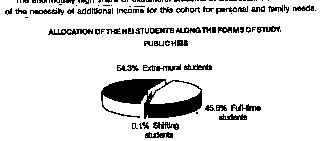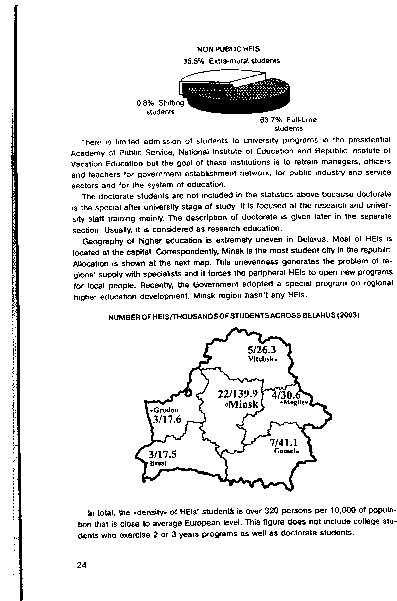Учебнометодическое пособие по дисциплине Иностранный язык (английский)
 Скачать 1.5 Mb. Скачать 1.5 Mb.
|
|
2. Give the plural of the following nouns: medium job government faculty woman-teacher branch degree speech pathway progress basis dictionary tutor advice experience criterion possibility information homework knowledge 3. Choose the appropriate noun for each sentence: 1) We had a lot of interesting … during our holidays. You need … for this job. (experience/experiences) 2) There are always no … with his studies. (trouble/troubles) 3) Our University was built of … (brick/bricks) 4) The … of our University consists of highly qualified specialists. (faculty/faculties) 5) A manager should have … in solving such problems. (experience/experiences) 6) A pupil had no … to get higher education. (stimulus/stimuli) 7) What are the … for this estimation? (criterion/criteria) 4. Read the text below. Use the word given at the end of each line to form a noun that fits in the space in the same line. How to learn vocabulary
5. Choose a or the in the following passage, in some places neither is possible: A/the professor is not a/the teacher in a/the secondary school, but has a/the highest academic position in a/the university. A/the lecturer is a/the university teacher. Lecturers and professors give a/the lectures. Students usually have a/the tutor who gives them a/the advice and teaches students in small groups. You graduate from university with a/the degree. If you do a/the postgraduate work, you will have a/the supervisor to help and advise you. 6. Fill in the missing prepositions where it is necessary. 1)Belarusian system … higher education includes educational, research and governing institutions. 2) Educational system supplies the national economy … highly qualified personnel. 3) The main part … full-time students belongs… the age group … the pupils graduated … school … appropriate time. 4) Study … public institutions is free … charge as a rule. 5) The second level … scientific degree named Doctor … Science … the field … a concrete discipline could be awarded … a person who has a candidate degree already. 6) Classical universities are mostly oriented … basic science and humanities. 7) Institutes mainly execute a limited number … programs … narrow field … disciplines.
SPEAKING 1. Discuss the following question: 1) What to teach and how to teach in modern universities? 2) What improvements should be made to our country’s education system? 3) Prepare short presentations about the founding fathers of the educational system in Belarus (F. Skorina, Simon Budny, Vassil Tyapinski ,etc.). 4) What proverbs or sayings can prove that education is very important and necessary thing? 2. Comment on the following quotations and discuss them with your partner(s):
3. Explain the following proverbs: a) Live and learn. Век живи, век учись.
e) Knowledge is light. Знание—свет. 4. Using the USEFUL VOCABULARY at the beginning of Part A prepare a talk for a foreign audience on the system of education in your country. Present it and answer the questions that may arise. FOCUS ON FUNCTION Agreement and Disagreement 1. Study the expressions useful to get someone’s opinions about the subject being discussed.
2. Here are some people's opinions. Make notes on what you'd say in response to them, using the phrases given below. If you disagree, explain your reasons for disagreeing. 1) “If you want to go to university, you usually apply during your last year at school, when you are 17.” 2) “University students usually live away from home.” 3) “tudents get a grant or a loan from the government to study.” 4) ’Some students don’t want to go straight from school to university, so they take a year out to work’. 5) ’The commercials on TV are usually more entertaining than the programmes.’ 6) ’Shops should all be open 24 hours a day, 7 days a week.’ 7) ’There's no point in buying expensive clothes. It's a waste of money.’ 8)’Clothes in bright colours like red and yellow are becoming fashionable.’ 9)’People spend too much money buying things they don't really need.’ 10)’Everything is cheaper in a supermarket than in a street market.’ That's true.And I also think that . . . I agree with you. And I also think that That's a good point. Don’t you also think that…? I see what you mean, but … Well, personally I think that ... I don't really agree because… I don't quite agree because… That's an interesting point of view, but I think... 3. Working with another student, take turns to respond to each opinion. Make sure you say more than just a few words in response. LISTENING 1. Work in small groups and discuss the following questions. a) At what age do you think you should ... - stop listening to parents and teachers and do what you feel is right? - be financially independent? - leave the family home? b) Have you ever taken your parents' advice and regretted it? c) Do you intend to follow in your parents' footsteps? 2. Listen to parents talking about their eighteen-year-old daughter. Decide which of the following sentences best summarises their feelings about daughter's plans for the future. a) They want their daughter to go to university but they're worried about supporting her financially. b) They think she should get a university degree before she tries to become a pop singer. c) They think that it would be a waste of time for her to go to university because she really wants to be a pop singer. 3. Listen again to the conversation and complete these extracts, using the phrases in the box.
a) Now she reckons she's going to … in the pop world. b) That's true, but once she gets a …, she'll find it more difficult to go back to college. c) At least if it doesn't work out she'll have a qualification … . d) We're just hoping that she'll get it … and then come to her senses and go back to her studies. e) ... we can't afford to pay for her to live in London, so it's … to make it work. 4. Work with a partner. Decide whether you agree or disagree with the following statements. Do you think your parents would have the same opinion? a) If you want to go travelling, it's best to get it out of your system before you start a career. Afterwards it's too late. b) Once young people have had a taste of freedom, it's difficult for them to go back and live with their parents. c) The more qualifications you've got behind you, the better your chances are of getting a good job. d) You don't need musical talent to make it in the pop world these days: just good looks and a good manager. e) Whether or not you succeed in life is up to you. Nobody else can help. WRITING 1. Using the following diagram explain the hierarchy and links in the system of higher education in writing.  Allocation of the HEI students along the forms of study Public higher educational institution 54.3% Extra-mural students  45.6% Full-time students 0.1% Shifting students Non public higher educational institutions  35.5% Extra-mural student 0.8% Shifting students 63.7% Full-time students Part B. The Belarusian State Economic University USEFUL VOCABULARY academic а – академический, academic year - учебный год accomodation n - жилье admission n -прием , admit v - принимать assistance n - помощь apply (to) v - обращаться appoint v - назначать approach n - подход award v - награждать education by correspondence - заочноеобучение council n - совет term n -семестр extra-curricular а - внеаудиторный diploma n - диплом to enter the University - поступитьвуниверситет faculty n - факультет, Syn. school found v - основывать, создавать grant v - предоставлять the humanities n -гуманитарные науки junior а - младший lecture n - лекция lecturer n - лектор, преподаватель lodging n- жилье obtain v- получать, достигать philosophy n- философия postgraduate (student) n - аспирант recreation n - отдых research n - научно-исследовательская работа scientist n - ученый scientific а - научный self-governing а - самоуправляющийся senior а - старший session n - 1) сессия, 2) учебный год subject n – предмет support v - поддерживать thesis n - диссертация enrolment n – зачисление в вуз train v - обучать |
